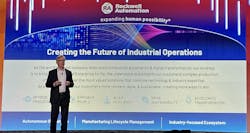Rockwell Automation’s Integration Strategy
“When you think about manufacturing, you can see just how it important it is. From
providing food and clean water to medicine and energy, what manufacturers do matters,”
said Blake Moret, chairman and CEO of Rockwell Automation, establishing the Make it
Matter theme at Automation Fair 2024.
He added that manufacturing is, of course, also critical to economies, noting that
Automation Fair attendees are “right in the middle of it” all with their work in industry.
“There’s nothing less at stake than expanding human possibility,” he said.
Moret’s positioning of the criticality to manufacturing to our economies and well-being
underscored his explanation of Rockwell Automation’s plans for the next few years.
“We’ve been playing defense to make Rockwell Automation more resilient and we’re proud
of what we’ve built and bought over the last few years to put together world-class assets in
the world of production,” he said. “And it’s all about driving the outcomes manufacturers
want—from optimizing production and empowering people to building operations
resilience, driving sustainability and accelerating digital transformation.”
Focusing on technology and services integration
The path forward for Rockwell Automation now is to integrate all the pieces the company
has long owned along with its more recent acquisitions, rather than looking to add new
capabilities from the outside in the near term.
The company’s plan is to drive inefficiencies out by bringing all its technologies together to
make them easier to apply, design and maintain. “That’s really our focus for the next couple
of years,” he said. “The opportunity to reduce risk is our best opportunity to make life
easier [for industry] when it comes to automation implementation,” Moret said.
Principal areas of focus for Rockwell Automation over the next few years include
production design, production control and production logistics—particularly as it relates to
material movement using independent cart technology and autonomous mobile robots.
Along with that, Moret said there will be a focus on providing software applications that
“make the most of the data that's a natural byproduct of these automation processes” and
applying the domain expertise of Rockwell Automation and partner experts to help
manufacturers “really understand what has to happen on the plant floor through the
lifecycle of these manufacturing solutions.”
Moret also pointed to the company’s plans to bolster its edge and cloud technologies,
noting the power of having edge- and cloud-based applications work well together to
enable a “resilient edge that can serve as the data broker for information moving up to and
down from the cloud.” This hybrid edge and cloud approach recognizes the realities of plant
floor operations, he said, because you can't always rely on a persistent cloud connection.
That’s why having dependable edge capabilities to hold data at the ready and reduce any
issues with cloud latency is critical.
Moving toward greater autonomy
Looking at Rockwell Automation’s plans to more fully integrate its tech stack, Moret said it's
ultimately about a “steady drum beat of moving from our traditional source of automated
control inputs, logic and outputs, and toward something more like autonomy. The key here
is to have systems in place that can learn [using artificial intelligence]. And we have
examples of that all the way through our tech stack.”
Based on conversations with customers, Moret said Rockwell Automation believes its best
opportunities for adding real value with AI is by making it part of existing workflows rather
than requiring manufacturers to rip out existing processes to implement AI. Doing that is
just too risky, he said, adding that “risk is the enemy of investment in new technology.”
Examples of where Rockwell Automation has added AI to its traditional automation
technologies can be seen at the:
- Sensor level with FactoryTalk Analytics VisionAI — a no-code approach to vision
inspection that can improve quality, maximize yield and gain insights from real-time
production data. - Logic level with FactoryTalk Analytics LogixAI, which continuously monitors
production operations to make predictions that enable operators and technicians to
stay ahead of product quality issues without having to develop home-grown
machine learning algorithms. - Asset level to predict equipment failures with FactoryTalk Analytics GuardianAI.
- Software level using GuardianAI to take information from drives, for example, and
bring it to Rockwell Automation’s Fiix computerized maintenance management
software and Plex smart manufacturing platform for demand planning.
“All of these are real world examples of how we’re adding value today by introducing AI to
make these processes more autonomous,” said Moret.
Under Rockwell Automation’s new integration and autonomy approach, Moret
acknowledged that the company recognizes that “all the [technology] pieces don't
seamlessly fit together yet.” But that’s the company’s goal for the next few years, which will
be helped along with Rockwell Automation’s consulting and integration expertise via
Kalypso and Knowledge Lens to “help manufacturers better define their business problems,
and then provide step-by-step approaches to bring all the parts together,” he said. “The
acquisitions of Kalypso and Knowledge Lens have really catalyzed our whole approach to
working with customers to help set a plan, understand where they are on their journey, and
work with them to take the next steps and quantify the benefits.”
About the Author
David Greenfield, editor in chief
Editor in Chief

Leaders relevant to this article:
